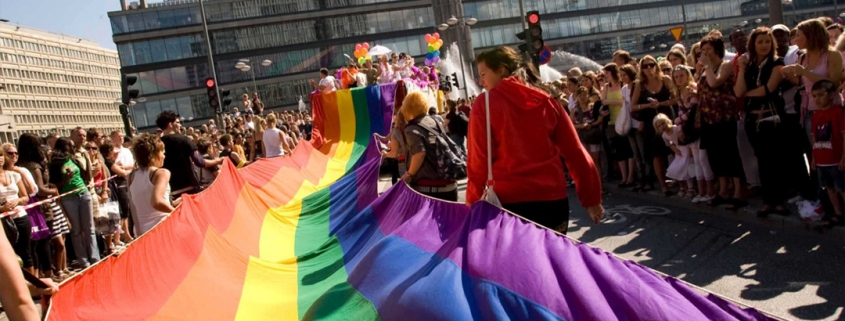6Rang Talks About Iranian LGBTQ Realities
During Stockholm Pride in Sweden, RFSL, together with 6Rang (Iranian Lesbians and Transgender Network), put together a seminar about LGBTQ people and sex reassignment surgery in Iran. Shadi Amin and Raha Bahreini, who have worked together in a study, published this year and first presented during Istanbul Pride;Pathologizing Identities – Paralyzing-Bodies, about people who have undergone sex reassignment surgery in Iran.
Every year thousands of Iranian LGBTQ people flee to neighboring countries to avoid being forced to undergo sex reassignment surgery. During two years, Shadi Amin, Raha Bahreini and their colleagues in the Iranian LGBTQ network 6rang, and the organization Justice for Iran have conducted a study about the real agenda behind, and the consequences of, sex reassignment surgery in Iran.
Shadi Amin, coordinator for Iranian Lesbian & Transgender Network – 6Rang, spoke about the horrors of the lives of trans* and homosexual individuals in Iran; the misinformation and the silence surrounding the situation.
Forced to undergo Surgery
Raha Bahreini, a legal researcher, explained that the regime in Iran, and the medical community that cooperates or adapts to the regimes directives, consider homosexuality as an illness and a defect. It’s not only trans* persons that are subjected to sex reassignment surgery; young homosexuals are increasingly targeted. Psychologists often perform a couple of tests that “show” that the boy or girl, who, according to their worried parents, is not acting “normally”, is “sick” and needs to be “cured”.
Shadi Amin says:
– Homo- and trans* phobia has been internalized into the society by the regime through the description of homosexuality in literature, research, the educational system and media. Even HBTQ people themselves have serious phobias and view themselves as sick. In that context it is not strange that HBTQ people agree to sex reassignment surgery, or even ask to have the procedure. For example, when a young man is in love with another man he might have the surgery so that he can be with his partner and be accepted by society, family and the system.
Multiple Surgeries at the Same Time
Shadi Amin mentioned several cases where the interviewed LGBTQ individuals had undergone surgery by doctors without expertize in sex reassignment surgery. When a patient cannot afford the extensive set of surgeries that are needed, they are performed all in one session, to save money. Both upper and lower parts of the body are operated on at one time. This is extremely painful, and there is a great risk of infections and other complications.
– One of the people in the study is a young woman who said she was taken to a psychologist, where a doctor said that her sexual preference could be cured by electro convulsive therapy. When she was taken to the clinic, against her will, she noticed many others in the same situation. She was traumatized even before the electro convulsive therapy, Amin says.
Raha Bahreini explained that the gender roles are carefully constructed by the Iranian regime. Homosexuality is described as a perversion. Society is composed of two different genders with distinct roles, attributes and qualities, and they should be kept separate from each other. A person belonging to the male sphere cannot navigate in the female sphere. This means that those who have non-normative sexual identities or do not identify either as a man or a woman have no place in society. Even HBTQ individuals are forced to view sex reassignment surgery as the only option to be accepted as a member of society.
The Problems Change in Character
In conclusion Nadia Zabehi, active within RFSL and 6Rang, pointed out that HBTQ individuals are questioned in every society. The difference according to her is that the reactions and the form they take differ.
– My problems didn’t diminish when I left Iran. They changed in shape, character and intensity. My experience is that the discrimination became more complex and harder to pin point. But it didn’t go away, not even in Sweden.
More than sixty people totally attended this seminar and had a chance to have open discussion and a question and answer session with the panelists. Two short films on confession and declaration of the story of two interviewees who participated in this research were played in between Shadi Amin’s talk. The discussions opened the door for deeper discussions around the issue in the future.
In the end, Kai Bergendal, a Swedish activist and trans-person, gave a short talk around the history of sex reassignment surgery in Sweden and the change of law to make it optional rather than compulsory.
6Rang in Stockholm Pride Parade
In addition to the seminar, 6Rang marched for those who can’t along all other groups in the Stockholm Pride parade. 6Rang members report that induring the parade, Iranians who had come to watch the event supported them in their work, hoping for cultural evolution and enhancement for human rights in their home country – Iran. Along the way the group of activists and intellectuals living in Stockholm joined 6Rang in support of their initiative and walked alongside them.
Short Biography of the Panelists:
Shadi Amin (شادی امین) is an Iranian feminist and activist who was forced to leave Iran in the 1980s because of her political activities and is now living in exile in Germany.
She has researched gender discrimination, systematic oppression against women and the status of homosexuals and trans* in the Islamic Republic of Iran.
She is the founder of the Iranian Women’s Network Association(Shabakeh)[1] and is currently one of the coordinator of the Iranian Lesbian Network (6Rang).[2] She is also working with Justice for Iran.
Raha Bahreini is an Iranian-Canadian human rights lawyer and advocate. She obtained her LLM in International Human Rights Law from the University of Essex, her JD from Osgoode Hall Law School, and her HBA in Women and Gender Studies from the University of Toronto. Ms. Bahreini has worked as a public interest law fellow atAmnesty International Canada and more recently as a senior research associate at the University of Essex Human Rights in Iran Unit where she contributed to the work of the United Nations Special Reporter on the Situation of Human Rights in Iran. Over the years, she has also conducted relevant research and advocacy work with Parkdale Community Legal Services (refugee and immigration division), Justice for Iran, and Iran Human Rights Documentation Centre, amongst others.
Nadia Zabehi, an Iranian/Canadian technologist and human rights activist, who got harassed, discriminated and dismissed from her job at Ericsson in Sweden for her gender identity and sexual orientation in March 2013 after filing for sexual harassment. She has 14 years of industrial and academic work experience in technology and is currently working as Incident and Problem Manager at Huawei Technologies AB. Besides, she is an activist within RFSL and 6Rang and is also a member of RFSL national board election committee.
Reference: http://www.soginews.com/6rang-talks-iranian-lgbtq-realities/


Leave a Reply
Want to join the discussion?Feel free to contribute!